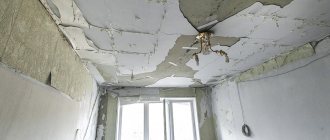Home / Real estate / Housing rights
Back
Published: 09/21/2016
Reading time: 9 min
0
3587
One of the old, but still relevant Russian problems is dilapidated houses. This problem is closely intertwined with the housing issue in general. And taking into account the latest government instructions on the resettlement of residents of emergency housing, the problem has become even more urgent.
In our article we will shed light on the problems associated with dilapidated houses, as well as the rights that residents of such houses have. We will separately consider the issue of the demolition of such buildings and compensation for housing, the timing and process of moving, as well as the privatization of housing in such cases.
- When is it possible to demolish a house and what rights do citizens have?
- When does housing fall into the emergency category?
- What will the residents of a privatized apartment receive if the house is demolished? Collect the purchase price of the home
- Obtaining equivalent living space
When is it possible to demolish a house and what rights do citizens have?
Eviction of citizens from a dilapidated house is applicable only in exceptional cases, which are provided for by the legislation of the Russian Federation.
The main goal envisaged by the eviction of citizens from their homes is the release of residential premises, which are in an emergency situation, in order to avoid the collapse of the house and accidental victims.
In practice, those citizens who live in brick houses whose wear and tear is more than 70% or 65% in the case of attics and wooden houses are subject to eviction. This percentage value is purely approximate, due to the fact that the legislation does not provide a formula for calculating the percentage of accidents at home.
Demolition of an unsafe or dilapidated house is possible in two cases:
- It is planned by the state program.
- Residents turned to the housing commission and asked for an examination and further demolition.
In practice, it is mainly barracks and old multi-storey buildings that were built in the last century that are subject to demolition.
The legislation clarifies that housing is not subject to demolition in the following cases:
- Multi-storey buildings (five or more) that do not have a garbage chute and an elevator are inoperable and cannot be reconstructed.
- Lack of centralized hot water supply or sewerage in one- and two-story buildings.
- If the housing does not comply with current housing standards, but was built before the adoption of the necessary regulations, but at the same time complies with ergonomic standards and allows the placement of furniture and other property.
It is important to know that eviction will not help improve the living conditions of the residents, because the number of square meters in the new housing will be the same as the old one.
You also need to take into account that you will not always get “new” housing in a new building; in practice, residents of unsafe and dilapidated houses are most often relocated to “secondary” type housing.
The current legislation does not have a time limit within which a dilapidated or dilapidated house will be demolished, and the residents of this house must receive new living quarters. Demolition deadlines are set by the municipal authorities and are subject to change.
The resettlement does not provide any benefits for certain segments of the population; there is only one general queue. But beneficiaries can count on additional square meters.
Having received a “new” home, you need to make sure that the redemption price for it corresponds to the expected one and that the apartment itself meets the standards of the country’s housing legislation. Otherwise, you should go to court to protect your rights. In such claims, the court most often takes the side of the victims.
NTVP "Kedr - Consultant"
LLC "NTVP "Kedr - Consultant" » Services » Legal consultations » Housing: purchase and sale, maintenance, payment » What can the owner of a room in an apartment building get if the house in which his room is located is being demolished?
The applicant owns a room in an apartment building; the house is currently being demolished.
Question: What can the owner of a room in an apartment building get if the house in which his room is located is demolished?
Lawyer's answer.
The rights of the owner of residential premises in connection with the demolition of a house are regulated by Article 32 of the Housing Code of the Russian Federation.
According to Part 5 of Art. 32 of the Housing Code of the Russian Federation, the owner of a residential premises subject to seizure, from the moment of the state decision on its seizure until an agreement is reached or a court makes a decision on the purchase of the residential premises, can own, use and dispose of it at his own discretion.
Redemption price of residential premises, terms and other conditions of redemption, as established by Part 6 of Art. 32 of the Housing Code of the Russian Federation, are determined by agreement with the owner of the residential premises. At the same time, Part 7 of this article provides that when determining the redemption price of residential premises, it includes the market value of residential premises, as well as all losses caused to the owner in connection with demolition and relocation, including losses that he incurs in connection with a change in place of residence , temporary use of another residential premises before acquiring ownership of another residential premises, relocation, search for another residential premises to acquire ownership of it, registration of ownership of another residential premises.
By agreement with the owner, he may be provided with another residential premises in exchange for the seized residential premises, with its value included in the redemption price.
If the owner of the residential premises does not agree with the decision to repossess the residential premises or an agreement has not been reached with him on the redemption price of the residential premises or other conditions for its redemption, the state authority or local government body that made such a decision may file a claim in court for the repurchase of the residential premises .
Thus, Art. 32 of the Housing Code of the Russian Federation establishes 2 methods of compensation to the owner for demolished residential premises: the purchase of premises in connection with the seizure of a land plot for state or municipal needs and the provision to the owner, by agreement with him, of another residential premises with its value offset against the redemption price.
At the same time, the owner has the right to buy out the residential premises by law, while the provision of another residential premises in replacement of the seized one is possible only by agreement of the parties . This means that the parties can only agree on the provision of other housing. The relocation authority does not have the right to forcibly, including in court, provide the owner with another residential premises, and in the same way, the owner of the seized residential premises does not have the right to demand that he be provided with other housing.
The legislator included in Art. 32 of the Housing Code of the Russian Federation also contains provisions regulating the procedure for confiscating residential premises located in an apartment building from the owners if the house is declared unsafe.
Thus, according to Part 10 of this article, the recognition, in accordance with the procedure established by the Government of the Russian Federation, of an apartment building as unsafe and subject to demolition or reconstruction is the basis for the body that made the decision to recognize such a house as unsafe and subject to demolition or reconstruction to present a demand to the owners of the premises in the specified building for its demolition or reconstruction within a reasonable time. If these owners do not carry out the demolition or reconstruction of the specified house within the established period, the land plot on which the house is located is subject to seizure for municipal needs, and accordingly, each residential premises in the specified house is subject to seizure, with the exception of residential premises owned by right property to a municipal entity, in the manner prescribed by Part. 1-3, 5-9 tbsp. 32 of the Code.
If, in relation to the territory on which an apartment building is located, recognized as unsafe and subject to demolition or reconstruction, a decision is made to develop the built-up area in accordance with the legislation of the Russian Federation on urban planning, the body that made the decision to recognize such a house as unsafe is obliged to submit owners of premises in the specified house require its demolition or reconstruction and set a period of at least 6 months for filing an application for a permit for the construction, demolition or reconstruction of the specified house. If such an application is not submitted in the manner prescribed by the legislation of the Russian Federation on urban planning activities by the owner or owners of the apartment building within the established period, the land plot on which the specified house is located and the residential premises in the specified house are subject to seizure for municipal needs in accordance with Part 10 of this article (Part 11 of Article 32 of the RF Housing Code).
Finally, the seizure of the land plot on which the apartment building is located, recognized as unsafe and subject to demolition or reconstruction, and residential premises in such a building before the expiration of the period specified in Part 11 of this article, in accordance with Part 12 of Art. 32 of the Housing Code of the Russian Federation is allowed only with the consent of the owner.
In practice, the owners of seized residential premises are provided with other residential premises, and not the value of the seized housing. Moreover, the issues of providing these other residential premises are resolved for the most part in court.
If the value of the residential premises transferred in exchange for the seized housing is lower than the price of the vacated property, then the difference must be paid to the owner. However, if the cost of the provided residential premises is higher than the redemption price of the seized housing, then it is unacceptable to oblige the owner to pay the difference.
This opinion is based on the explanations given by the Presidium of the Supreme Court of the Russian Federation in Resolution No. 48pvO2 of April 2, 2003. Although these clarifications were given regarding the application of the norms of the old housing code of the RSFSR, they remain relevant today, especially since the new housing legislation also does not impose an obligation on the owner of the seized residential premises to pay the difference.
In this Resolution, the Supreme Court of the Russian Federation overturned the decisions of lower courts, which considered that a citizen must pay the difference in the cost of residential premises if the apartment provided is more valuable, since such an obligation, according to the courts, follows from the norms of civil law governing the exchange agreement. In this case, according to the courts, it is necessary to take into account the norm of paragraph 2 of Art. 568 of the Civil Code of the Russian Federation, which establishes that in the event that, in accordance with an exchange agreement, the goods exchanged are recognized as unequal, the party obligated to transfer the goods, the price of which is lower than the price of the goods provided in exchange, must pay the difference in prices immediately before or after fulfilling its obligation to transfer goods, unless a different payment procedure is provided for in the contract. However, these court conclusions are based on incorrect interpretation and application of substantive law.
The legal relations that arise are regulated both by the norms of civil legislation on the procedure for the implementation and protection of ownership of residential premises, and by special norms of housing legislation that provide for the procedure for providing residential premises to citizens who, for one reason or another, have lost their housing. It should also be borne in mind that the rights of owners of residential premises and members of their families, due to the special significance of the constitutional right of citizens to housing, are protected by the norms of not only civil, but also housing legislation.
Since the demolition of a house violates the legal rights of apartment owners and members of their families, these persons have the right to demand the restoration of their rights in full by providing equivalent housing without establishing any counter-obligations to bodies and organizations obliged to restore the housing rights of these citizens.
In the case of demolition of a house, there arises not a relationship under an exchange agreement based on freedom of contract (Article 421 of the Civil Code of the Russian Federation), but a relationship based on the obligation of the bodies and organizations carrying out the demolition of the house to provide the owners of the demolished housing with other equivalent residential premises. However, the law does not establish the obligation of the owner of apartments in a demolished building to compensate for the difference in the cost of the housing he rents and the housing provided to him.
Providing the owners of seized residential premises with other housing, rather than the redemption value of the seized property, is caused by the reluctance not only of the authorities confiscating housing to provide compensation in exactly this way, but also of the evictees themselves, who, taking into account the peculiarities of Russian real estate pricing and the fact that the cost of housing is calculated based on of square meters, they fear that with the money received as ransom they will not be able to buy housing equivalent to the one seized.
According to paragraph 7 of Art. 32 of the Housing Code of the Russian Federation, the redemption value consists of several components.
1. Market value of the seized residential premises. This value is assessed by professional appraisers. As a general rule, the responsibility to assess the value of residential premises should rest with the relocation authority. If the owner does not agree with the results of the assessment, he has the right to make such an assessment independently and at his own expense. Disputes regarding the amount of compensation must be resolved in court. In this case, in order to comply with the law and the rights of the parties in civil proceedings, the court is obliged to order a forensic examination of the value of the seized residential premises. If there is no dispute between the parties regarding the value of the residential premises, assessed by the relocation authority in pre-trial proceedings, the court must accept this assessment. However, it is necessary to keep in mind that the assessment should be carried out no more than 6 months before going to court (clause 20 of the Government of the Russian Federation of July 6, 2001 No. 519 “On approval of assessment standards” (as amended on December 14, 2006 G.).
2. Losses that the owner incurs in connection with a change in place of residence. In particular, if the new place of residence is located further than the previous one from the place of work or study of the owner, the cost of travel to the place of work or study increases for him.
3. Losses associated with payment for the use of other residential premises before acquiring ownership of other housing. For example, the owner of the seized residential premises will be forced to rent an apartment.
4. Losses associated with relocation. For example, payment for transport services, services for loading and unloading things, purchasing furniture instead of built-in furniture according to an individual project.
5. Expenses borne by the owner of the seized residential premises in connection with the search for another residential premises for living, including for the acquisition of its ownership. These expenses may include payment for real estate services, payment for placing advertisements in newspapers, etc.
6. Losses associated with registration of ownership of another residential premises. For example, the amounts required to pay for state registration of such a contract for the sale of residential premises.
7. Losses incurred by the owner of the seized residential premises as a result of the early termination of his obligations to third parties. For example, the owner rented out residential premises and, by virtue of the contract, agreed to pay the tenant moving expenses in the event of early termination of the contract.
8. Lost profits. Lost profits in civil law mean lost income that a person would have received under normal conditions of civil transactions if his right had not been violated (Article 15 of the Civil Code of the Russian Federation). In relation to the loss of residential premises, lost profits can be understood as the amounts that the owner would have received in the form of payment in the event of renting out this premises, if the rental agreement had not been terminated as a result of its withdrawal. Or, for example, the cost of a major overhaul of a house that has not been carried out, since if it had been done, the apartment would have cost more.
Prozorova Ksenia Petrovna
The consultation was given in November 2015 as part of the “Professional Lawyer 2015” competition
When does housing fall into the emergency category?
Housing can be recognized as subject to demolition, reconstruction or emergency if it meets the standards approved by the government:
- If the building's foundation, load-bearing structures, walls have been damaged, as well as in case of noticeable biological damage, which indicates a threat of building collapse.
- If residential apartment buildings have previously suffered serious damage as a result of man-made disasters, natural disasters or fires, or if there is damage to load-bearing structures that cannot be restored or is not economically viable to repair.
- If housing is at constant risk due to the climatic conditions of the region (landslides, mudflows, avalanches, floods, etc.).
- If the house is located in a place of possible destruction in the event of a man-made accident (except for those cases where possible destruction can be prevented).
Also, your home may be considered subject to demolition in the following cases:
- If the windows face the highway, and the noise level exceeds all permissible standards and values.
- When a residential building is located in a place of constant exposure to harmful factors of various nature (chemical, industrial or biological), taking into account the impossibility of eliminating the risk.
- If there is a waste disposal facility or overhead AC power lines near your residence.
It is worth considering that most often those citizens who actually live in places with a constant risk to life and health are subject to resettlement.
Legislative trap
Of course, these costs are by no means small. That is why the legislation has provided a clause according to which it is possible to offer the owner another apartment in exchange for the seized one, including the cost of the latter as part of the redemption price. How can this be understood practically?
Simply put, after taking your apartment, the state can offer you another one. But if the market value of the latter is higher, you will be required to pay extra. Suppose you are the owner of a one-room Khrushchev house (old and without renovation). Of course, its market price is small and in no way comparable to the cost of a brand new one-room apartment in a new building. And you are offered a choice: receive compensation, the amount of which is unlikely to be enough to purchase anything decent, or pay the difference for a new apartment.
For people with modest incomes, none of the proposed options is suitable. They have nothing to pay extra, and it is impossible to buy anything with the pennies allocated to replace dilapidated housing. In addition, the Housing Code does not provide any indication of the equivalence of the housing offered to the owner in terms of footage or number of rooms. We are talking only about the cost of the apartment offered as a replacement.
What will the residents of a privatized apartment receive if the house is demolished?
Residents of privatized housing have two options for further developments:
Collect the purchase price of the home
An appropriate agreement is concluded, which spells out all the details and nuances.
The purchase price of housing, according to the contract, includes not only the cost of the apartment itself, but also the costs of purchasing a new home as a whole (including the cost of moving), as well as lost profits (if the apartment was previously rented out). The contract may stipulate that the owner of the old emergency home will receive a new apartment in exchange for the redemption price of the housing. For a more accurate assessment of the redemption value, it is worth contacting professionals from appraisal companies.
Obtaining equivalent living space
According to the law, “new” housing must have the same number of square meters and rooms as the old one, and also have the same level of amenities and be located in the same area as the house that is to be demolished.
It is interesting that in the legislation, with an equivalent area of provided housing, we are talking about the total area of the apartment, and not about the living area. This is a significant disadvantage, because the “new” apartment may have a large storage room or corridor, which the citizen has no use for, and the area of the provided apartment will be the same as the old one.
What to demand - monetary compensation or equivalent housing
As already mentioned, as compensation for the seizure of a residential building intended for demolition, a government agency or developer may offer the home owner a cash payment or a similar house. Owners should be aware that when a residential building with a land plot is seized by a developer, they have the right to demand any compensation at their discretion (since the law does not oblige them to make concessions) :
- cash payment for the purchase of a new home of similar value,
- new housing (cottage with land or an equivalent apartment),
- payment of expenses for moving and transportation of property.
Another case is the forced repossession of a house by a municipal or government agency. In such a situation, the law is on the side of the government, and therefore the housing and land will in any case be alienated immediately after the completion of the procedure (execution and registration of the accompanying permitting documentation). Therefore, in any case, the matter will come to the approval of the redemption value and the renunciation of property rights - whether this will be voluntarily, or through the courtroom.
Based on all of the above, we will figure out what is more profitable for the owner of a house who has lost his property due to the emergence of municipal/state needs for the seizure of land and house:
| Financial compensation | Equal Housing |
The redemption value of the seized object consists of the following components:
If the owner of a house with a plot chooses monetary compensation, a special assessment commission is convened. The amount of payment will be determined in accordance with the decision of the experts of this commission , and there is not always enough money to purchase a similar house (and all because repairs and inseparable improvements are not taken into account). | Getting housing of similar cost is a winning option for 3 reasons:
|
If housing is not privatized
Residents of non-privatized housing have two other options:
- Try to privatize the apartment. Despite the absence of prohibitions on the privatization of such housing, in practice the housing department of the municipal administration often refuses to register housing that is subject to demolition.
- Residents are provided with new living quarters, which are equivalent to emergency ones.
It is important to know that if you lived in isolated housing, you cannot be provided with rooms in a communal apartment.
What is the difference
The main thing to understand is that housing can be either your own or state-owned. That is, it is provided to you according to a so-called social rental agreement. In the first case, the real estate is your property, it belongs to you and only you, no one has the right to come and take away your living space just like that (without serious reasons). This applies to everyone whose apartment is privatized.
If the occupied housing has municipal status (second option), those who live in it are only registered (registered) in the specified area, but have absolutely no property rights in relation to it, even if the family’s residence here is calculated for decades. That is, you simply rent your apartment from the state.
If it is necessary to demolish a house, the issue of providing housing to replace the destroyed one is decided based on whether it is municipal or your own.
Moving dates and procedure
The timing and procedure for moving residents of dilapidated houses to new housing is determined by municipal authorities in each specific region.
After the interdepartmental commission has completed its work and made a decision to recognize the house as unsafe or dilapidated, the municipal authorities issue an order to put the house on the demolition queue. The queue itself is formed in each individual region.
From this moment on, the authorized bodies are searching for appropriate housing for residents and relocating them. This can take several months or several years, depending on the efficiency of officials, the condition of the house (priority) and the availability of housing that meets the standards on the real estate market or in the housing reserve.
Find out from us how to rent an apartment through an agency correctly and without problems in the future. Extract from the house register - why is it needed and where can I get it? Find out about it in our article! Lifetime rent of an apartment is perfectly described in our material at the link!
Which article will protect us?
Although article 89 of the Civil Code of the Russian Federation does not stipulate the state’s obligations to take into account the interests of individual citizens, there is also article number 58. It concerns taking into account the legitimate needs of the latter. It is there that it is indicated how apartments are given to tenants when a house is demolished, and what to focus on in a relocation situation.
Paragraph 1 states that a room can be occupied by people of different sexes (except spouses) only with their consent. What does this mean practically? A family with two children living in a two-room apartment can apply for an additional third room when moving. The fictitious divorce scheme also continues to operate.
In addition, paragraph two of the same article number 58 states that if a family lives in a one-room apartment or a single room in a communal apartment, the new living space may exceed the norm for one person (up to two times). That is, residents of communal apartments, theoretically, still have the chance to move into separate apartments, and a family with children huddled in an old one-room apartment can hope for a gift in the form of a new two-room apartment.
There is also information about taking into account the interests of citizens with severe chronic diseases.
Legal requirements for the procedure
Is it possible to privatize emergency housing? Article 4 of the law “On Privatization...” contains a direct prohibition on the transfer into the ownership of citizens of residential premises located in unsafe buildings.
If a residential building is officially recognized as unsafe, an apartment in it cannot be privatized even through the court.
How to privatize dilapidated housing? Due to the absence of the concept of dilapidated housing in the law, its privatization is possible. Where to begin? Privatization in this case is carried out as usual .
Submitting an application to the administration that owns the housing. The basis for privatization is the social tenancy agreement, on the basis of which the tenants moved into the apartment.
The application is signed by all citizens registered at this address, as well as those persons who are included in the rental agreement, but do not currently live in the apartment. The application is accompanied by a package of documents :
- Registered passports or birth certificates of minors (copies).
- Information about those registered in the living space.
- Lease agreement. In case of his absence, a move-in order is provided.
- Technical documentation of housing.
Notarized refusals from privatization (if there are persons registered in the apartment, but who do not want to receive its share).
If the refusal is issued by citizens from 14 to 18 years of age, permission from the guardianship authorities will be required.Children under 14 years of age receive a share in residential premises without fail, so a waiver cannot be issued on their behalf.
- Certificate Form No. 9 (from citizens who checked out of the apartment from the moment they moved in until the moment they submitted the application).
- Certificates of change of surname (if available).
- Power of attorney for privatization (if any of those registered cannot participate in the procedure in person).
- Certificates of non-participation in privatization (read our article about the possibility of repeated participation).
- Receipt for payment of state duty (1000 rubles per person).
After reviewing the documents, the owner of the premises draws up an agreement for the transfer of residential premises into the ownership of citizens. All future owners of shares in the premises, excluding those who refuse, must appear at the same time to sign the document.
The signed Privatization Agreement is transferred to Rosreestr to obtain a Certificate of Ownership . When submitting an application to Rosreestr, all parties to the agreement must also be present.
Based on the results of registration, all parties to the agreement receive Certificates of ownership of shares in the apartment.
You can submit an application for privatization through the MFC. The procedure for submitting an application and further processing of documents is identical to that described earlier.
The difference is that all the necessary documents can be obtained using the “one window” principle directly from this organization.
Tenants of dilapidated housing have every right to privatize it if the premises do not have emergency status. The refusal of officials to conclude an agreement can be appealed in court.
What you should know
Of course, the owner has the right to categorically refuse all proposed options for providing housing during the demolition of the house, as well as monetary compensation. But in the absence of a final agreement, the state reserves the right to resolve the issue in court. The resettlement program implemented by the capital's authorities in recent years has given rise to many conflicts and difficult situations. And in this case, you need to remember the following:
- The owner must be notified in writing about the future seizure of the apartment at least one year before the event occurs.
- Residential premises can be purchased earlier than a year after the owner receives such a notice only with his consent (Article 32, paragraph 4 of the Housing Code).
What's the catch here? When the year ends and no agreement has been reached, the state has the right to buy it through the courts.
Is it possible to privatize an apartment that is being demolished?
The procedure for privatization of housing is determined by Federal Law No. 1541-1 “On Privatization” (as amended in 2021). According to Article 4, emergency and dilapidated housing is not subject to privatization . Consequently, it will not be possible to transfer such apartments into ownership (see “How to privatize an apartment under a social tenancy agreement?”).
But this does not mean that council housing tenants will remain “on the street”. The administration must provide them with comfortable living quarters on the same basis, that is, under a social tenancy agreement (Articles 86 and 89 of the Housing Code of the Russian Federation). The difference from the cases with homeowners is that tenants will not be able to receive compensation , because... are not the owners of the apartment.
The question arises: why is it impossible to privatize an apartment for demolition of the building?
This can be explained very simply – the housing is unsuitable for living. Even if the tenants of the municipal apartment insist on privatization, they will be refused - and they will be right. It is not beneficial for the state for dilapidated/dilapidated housing to pass into the hands of ordinary citizens. Moreover, in case of demolition, privatized objects are purchased from the owners.
Conditions for the provision of residential premises during the demolition of emergency apartment buildings
Residential premises located in an apartment building, which is recognized as unsafe and subject to demolition, are unsuitable for living (part 4 of article 15 of the Housing Code of the Russian Federation
).
If the house is recognized as unsafe, the state authority or local government that made the corresponding decision (hereinafter referred to as the authorized body) issues an order indicating the deadline for the resettlement of citizens (clause 49 of the Regulations, approved by Decree of the Government of the Russian Federation of January 28, 2006 No. 47
).
The conditions for the provision of residential premises in replacement of apartment buildings confiscated during demolition depend on whose ownership the confiscated residential premises are located.
How it really happens
In real conditions, the housing issue is resolved in the process of eviction from a house being demolished each time in its own way. The demolition of houses in Moscow and St. Petersburg is quite clearly regulated by law. But a number of constituent entities of the Russian Federation, when resolving the issue, are guided only by the provisions of the Housing Code.
In addition, quite a lot depends on the budget of a particular subject of the Russian Federation. In some cities, it is easier for the state to provide alternative housing to residents. In others, the purchase of premises by the authorities is more profitable than the provision of real square meters.
Often, citizens, while waiting for the demolition procedure, try to register as many relatives as possible in their own living space or file a fictitious divorce with a subsequent demand from the authorities for much more living space than the previous living space. As a rule, both sides are dissatisfied. And it is almost impossible to predict the development of events in each specific situation.
If you categorically disagree with the conditions under which the authorities offer you a buyout or exchange of your apartment, and a peaceful agreement cannot be reached, stock up on money for lawyers and go to court.









